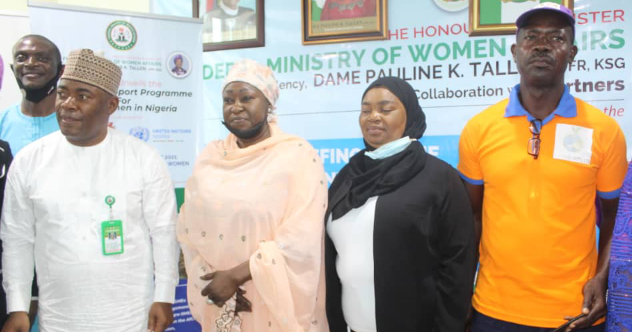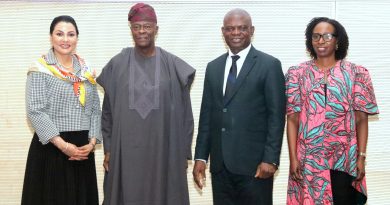Lack of Land Ownership Makes Nigeria Women Poor- UN women
Maryam Aminu
United Nations Women Country Representative, Ms Comfort Lamptey has identified lack of land ownership as a major cause of poverty in Nigerian women.
Ms Lamptey who was represented by Patience Ekechukwu said this in Abuja at the joint ministerial press briefing for the United Nations International Rural Women and World Food Day with the Ministry of Women Affairs, Dame Pauline Tallen and partners on 15th October, 2021.
“We believe that policy makers can further strengthen food production through rural women fathers by building programmes that takes into consideration rural women and men differentiated needs and resources, governments can better strengthen rural communities’ resilience and ability to cope with high food prices and food food price sparks in the long run”, she said adding that the United Nations Women was committed to “supporting member states as they set global standards for achieving SDGs 5 ‘gender equality’ and works with governments and other authorities to design laws, policies, programmes and services needed to ensure that the standards are effectively implemented and truly benefit women and girl, in rural Nigerian communities.
Lamptey noted that the critical role and contribution of rural women farmers in enhancing agricultural and rural development, improving food security and eradicating rural poverty cannot be over emphasized.
She stated, “However, UN Women believes that although women farmers in Nigeria work very hard, many remain poor due to multiple barriers, including lack of access to land. This remains one of the barriers which needs to be removed to ensure effective and efficient production of food crops.
“Rural women and girls play essential roles in food systems from production, to processing, preparation, consumption, and distribution of food as well as in securing household and community nutrition.
“Yet, unequal power relations between women and men in the household and society, discriminatory gender norms and practices, prevalent violence against women and girls, results in unequal access to food and heightened experience of hunger, malnutrition, undernutrition, and food insecurity.
Also speaking, the Director General C4D Project Mr Lugard Okonobo added that indeed the power of rural women in food systems cannot be under rated yet they are faced with lot of challenges ranging from violence to insecurity.
There is need to encourage, reward and recognize rural women, Okonobo added.
The Minister of Women Affairs, Dame Pauline Tallen, who was represented by the Permanent Secretary of the Ministry, Olufunso Adebiyi said that lack of coordination / unity between the various partners was responsible for less impactful women empowerment efforts in the country and called for a more strategic approach for effective synergy and tapping into the expertise of resourceful partners.
He noted that genuine women empowerment scheme, fully coordinated by the ministry would improve the level of areas covered for women empowerment.
The minister explained that while the ministry was aware of the various cultural barriers, on women’s access to land, it cannot deny the fact that such cultural practices suffered gradual death owing to the respective laws of each state on land allocation.
Olufunso said “It is high time we come together, to holistically channel all these individual and isolated efforts into a big whole for impact.”




